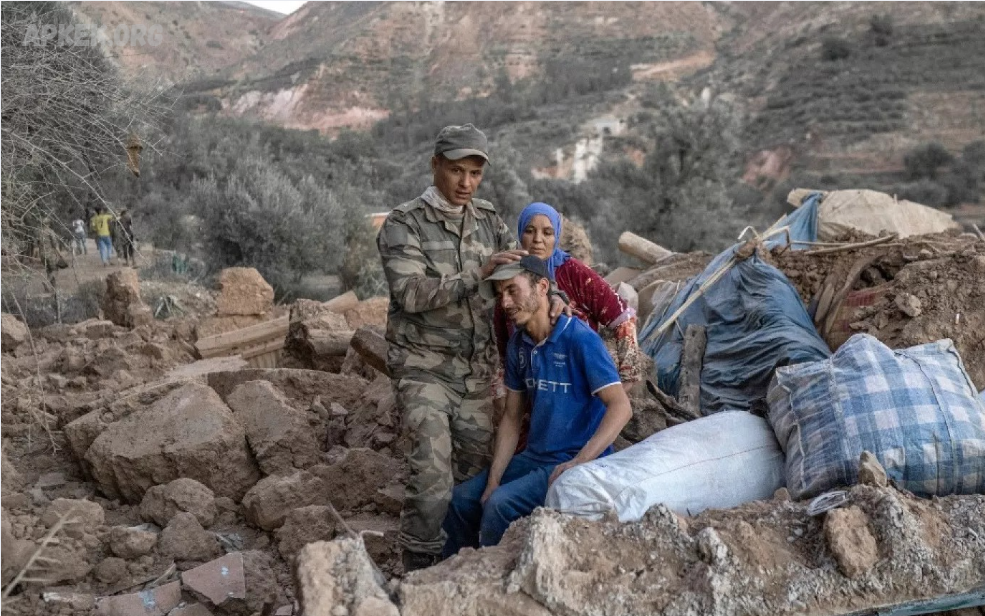Communities across Morocco and Libya are united in grief as they mourn the tragic loss of lives displaced by ongoing conflicts and crises. Families shattered and futures disrupted, these victims face immense hardships as they navigate the aftermath of violence and instability. Their stories highlight the human cost behind headlines and statistics, reminding us of the urgent need for compassion and support.
The displacement has uprooted thousands from their homes, forcing many into precarious living conditions far from safety and security. Access to basic necessities such as food, shelter, and healthcare remains a daily struggle for those affected. The emotional toll is equally profound, with survivors grappling with trauma and uncertainty about what lies ahead.
Despite the darkness, there is a resilient spirit among the displaced communities in Morocco and Libya. Aid organizations and local groups continue to offer assistance, while families and neighbors come together to rebuild hope. Yet, the road to recovery is long, and the memories of lost loved ones remain a painful reminder of the urgent need for lasting peace and stability in the region.
The Human Toll of Displacement in Morocco and Libya
The ongoing conflicts and crises in Morocco and Libya have forced thousands of people from their homes, leaving deep scars on individuals and communities alike. Displacement uproots families, strips them of security, and thrusts them into a daily struggle to survive. Beyond the immediate loss of shelter, displaced individuals face limited access to basic needs such as food, clean water, and healthcare, making their situation increasingly desperate.
For many, the trauma extends far beyond physical hardships. The emotional toll is immense, as families mourn loved ones lost to violence or the dangers of forced migration. Children are especially vulnerable, often deprived of education and stability during formative years. The psychological impact of such upheaval can last a lifetime, affecting entire generations.
Despite these challenges, stories of resilience emerge from within displaced communities. People come together to support one another, and humanitarian organizations work tirelessly to provide aid and hope. Still, the human toll of displacement in Morocco and Libya is a stark reminder of the urgent need for lasting peace and solutions that restore dignity, security, and opportunity for those affected.
Stories of Loss and Resilience Amid Crisis
Amid the turmoil sweeping through Morocco and Libya, countless stories of loss and resilience have emerged from the hearts of those affected by displacement. Behind every statistic is a person— a mother, father, child— grappling with the harsh realities of conflict and upheaval. Many have lost homes, loved ones, and the sense of normalcy that once grounded their lives.
Yet, even in the darkest moments, the strength of the human spirit shines through. Families displaced by violence have shown remarkable courage, adapting to uncertain conditions while supporting each other through immense challenges. Communities come together to share scarce resources, rebuild what they can, and find hope in solidarity.
Humanitarian groups play a crucial role, offering shelter, food, and medical care, but it is often the resilience within these communities that fuels the drive to survive and eventually rebuild. These stories of perseverance highlight not only the tragic cost of crisis but also the power of hope and determination. They remind the world that, even in times of great hardship, the will to overcome can inspire healing and renewal.
Challenges Facing Displaced Families
Displaced families in Morocco and Libya face a complex web of challenges that make everyday survival a daunting task. Forced to flee their homes due to conflict or instability, many find themselves living in overcrowded shelters or informal settlements with limited access to clean water, nutritious food, and adequate healthcare. These basic needs are often difficult to meet, leaving families vulnerable to illness and malnutrition.
Beyond physical hardships, displaced families endure emotional and psychological struggles. The trauma of losing loved ones, homes, and familiar surroundings can lead to anxiety, depression, and a sense of hopelessness. Children, in particular, suffer deeply, with many missing out on education and the stability crucial for their development.
Safety is another major concern. Displaced people frequently face risks such as exploitation, discrimination, and violence, especially women and children. Access to legal protection and support services is often limited, compounding their vulnerability.
Despite these overwhelming obstacles, displaced families display resilience and strength. However, to truly support them, long-term solutions that address both immediate needs and root causes of displacement are essential. Only through coordinated humanitarian efforts and sustained peace initiatives can these families hope to rebuild their lives with dignity and security.
Read Also: Canada Expels High Indian Diplomat Whereas Investigating Homicide of Sikh Activist 2025
The Emotional Impact on Survivors
The emotional impact on survivors of displacement in Morocco and Libya is profound and often overlooked. Beyond the visible losses—homes destroyed, communities torn apart—many survivors carry deep psychological wounds. Experiencing violence, separation from loved ones, and the uncertainty of displacement leaves lasting scars that affect mental health.
Feelings of grief, fear, and trauma are common among those uprooted from their lives. Many survivors struggle with anxiety and depression as they cope with the sudden loss of security and stability. Children, in particular, are vulnerable to these effects, facing disruptions in their education and social development, which can hinder their ability to heal and move forward.
Survivors often feel isolated, cut off from their support networks and unsure of what the future holds. This emotional strain can make it difficult to rebuild lives and communities. However, with access to psychological support and safe spaces to express their experiences, many survivors begin to find hope and resilience.
Humanitarian Efforts and Community Support
In the face of displacement and crisis, humanitarian aid and community support have become lifelines for thousands in Morocco and Libya. International organizations, local charities, and volunteers have stepped in to provide urgent assistance—offering food, clean water, medical care, and temporary shelter to families who have lost everything. Their work is vital in addressing both the immediate and long-term needs of displaced communities.
Equally important is the strength of local support. In many towns and villages, residents have opened their doors, shared limited resources, and offered emotional comfort to those fleeing danger. These acts of kindness, though sometimes overlooked, are powerful examples of solidarity in times of hardship.
Despite limited funding and challenging conditions, humanitarian workers continue to deliver critical aid with determination and compassion. They also help create safe spaces for children, offer counseling for trauma survivors, and support education initiatives, ensuring that even in crisis, hope is not lost.
Frequently Asked Questions
Are children receiving any education?
Access to education is limited, but some organizations are setting up temporary learning spaces to help children continue their studies.
What are the mental health impacts on survivors?
Many survivors experience trauma, anxiety, and depression due to the loss of loved ones, homes, and stability.
How can I help or donate?
You can support reputable humanitarian organizations that are active in the region through donations or awareness campaigns.
Is there hope for long-term recovery?
Yes, with sustained peace efforts, international support, and community rebuilding, long-term recovery is possible.
What is needed most right now?
Immediate needs include shelter, clean water, food, medical supplies, and long-term support for education and mental health care.
Conclusion
The stories unfolding in Morocco and Libya are not just headlines—they are lived realities for thousands of families torn from their homes and communities. While the pain of displacement is deep and lasting, it is met with remarkable resilience. Amid loss, people continue to hope, rebuild, and support one another in any way they can.

